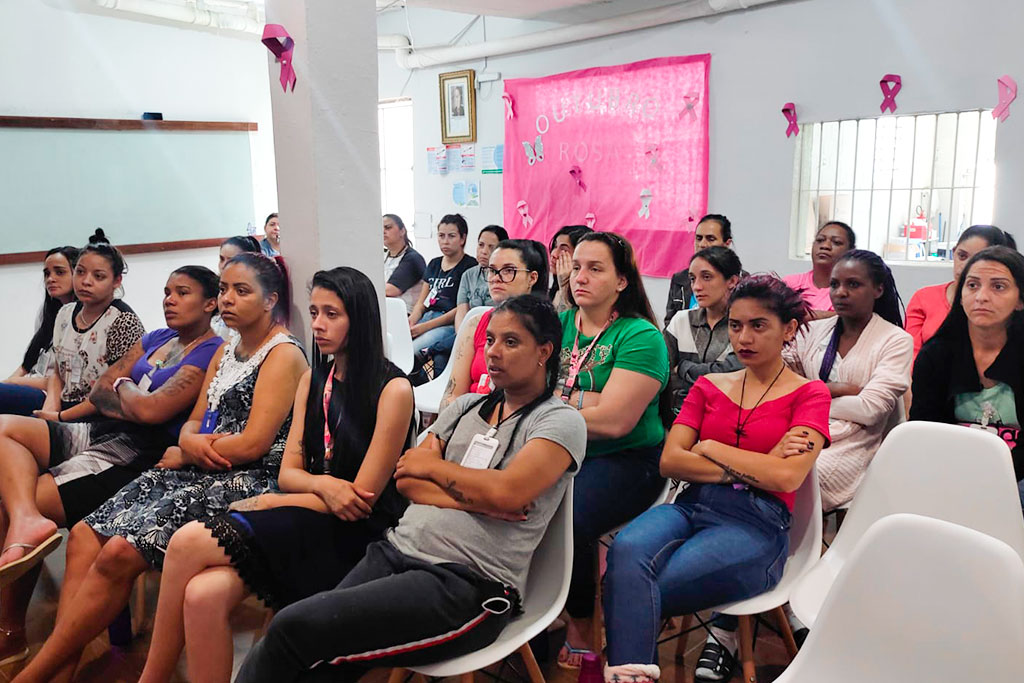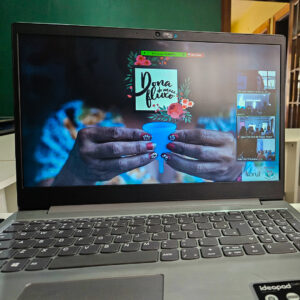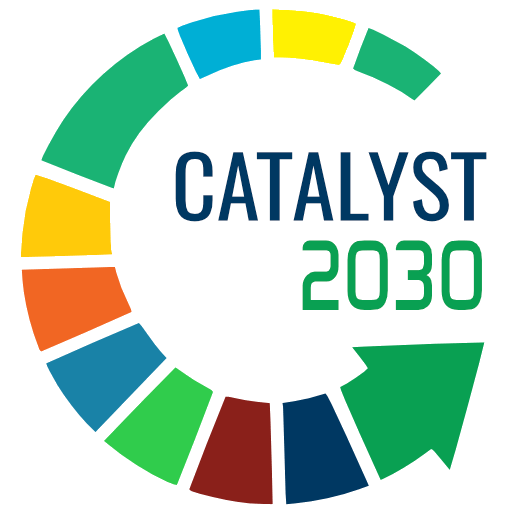
How can women deprived of their liberty be reintegrated into society with dignity? Around here, we believe that developing an entrepreneurship project for women is a promising alternative. That’s why we teamed up with the Association for the Protection and Assistance of Convicts (APAC) to design a proposal.
The project envisages hybrid training and is in the process of actively attracting partners and funding. The aim is to bring more dignity and hope for the future to these women through female empowerment and entrepreneurship.
It comes in the context of the Brazilian Fraternity for Assistance to Convicts’ (FBAC) valorization of APAC Women with the creation of the campaign “It’s not about where I’ve been, but about where I want to be”.
A relationship built little by little
The collaboration between Raízes and the APAC’s Women is not new. In 2022, we held three face-to-face workshops and donated 150 menstrual cups to women deprived of their liberty at the Women’s APAC unit in Belo Horizonte, the capital of Minas Gerais, through the Dona do Meu Fluxo (DMF) Project. The initiative was conceived by Korui Ciclos de Vida and Raízes to empower and bring menstrual dignity to women in situations of social vulnerability.
Over the months of this year, we have once again carried out these actions, this time in all the Female APAC units and through a hybrid model. We broadcast the workshop remotely and the women met in person in the study/event rooms in the cities of Frutal, Viana, Itaúna, Governador Valadares, Conselheiro Lafaiete, São João Del Rey, Rio Piracicaba, and Pouso Alegre.
This model was strategically important for the partnership between Raízes and APAC to develop entrepreneurship as an alternative for the reintegration of female inmates.
To further consolidate this partnership between our social business and the institution for this entrepreneurship project, Mariana Madureira took part in the launch of the promotional video for the campaign “APAC Feminina: dignidade e respeito às mulheres privadas de liberdade” (APAC Feminine: dignity and respect for women deprived of their liberty), organized by the Brazilian Fraternity for Assistance to Convicts (FBAC). The meeting brought together more than 70 people on October 27, including inmates from the Women’s APAC in Belo Horizonte, public defenders, and authorities representing other units, among others.
Watch the full production below (in Portuguese):
In June, Mariana Madureira also visited the Men’s APAC in São João del Rei, also in Minas Gerais, as a member of the Folha Network of Socio-Environmental Entrepreneurs for an immersion in the subject. That’s why this relationship was built and strengthened.
The Brazilian and global incarceration scenario
The World Female Imprisonment List carried out a survey and revealed that Brazil has the third-largest female prison population in the world, behind only the United States and China. Eight years ago, Brazil was in 5th place. With around 40,000 women in prison, the country has quadrupled this population in just 20 years.
According to the Brazilian Fraternity for Assistance to Convicts (FBAC), the national average for recidivism, i.e. people who commit crimes again, is 41.9%, leaving the average for reintegration into society at 58.1%, showing us that something isn’t right.
The precariousness of the Brazilian prison system is a serious problem and, based on statistics provided by the Justice Department to Jusbrasil, almost 90% of the prison population is living inhumanely. Numerous factors about the precariousness of the prison system are evident, from overcrowding, inadequate physical space, the system’s lack of structure, to poor medical care and personal hygiene.
Another piece of data, this time from Infopen Women, shows that women in situations of deprivation of liberty have a racial profile and age: black and brown women make up 63.55%. Women prisoners up to the age of 29 make up 47.33% of this population.
A little more about APAC
The Association for the Protection and Assistance of Convicts (APAC) is a civil entity under private law, with its own legal personality, dedicated to the recovery and social reintegration of convicts sentenced to deprivation of liberty. It also operates as an auxiliary entity to the Judiciary and the Executive in the carrying out of criminal sentences and in the administration of the enforcement of sentences.
With its own methodology, made up of 12 elements, the association applies them harmoniously and provides people deprived of their liberty with the conditions to change their lives.
The elements are:
- Community participation;
- Recovered helping Recovering;
- Work;
- Spirituality;
- Legal assistance;
- Healthcare;
- Human valorization;
- Family;
- Volunteers and their training;
- Social Reintegration Center – CRS;
- Merit;
- Journey of Liberation with Christ (APAC welcomes inmates of any religion, including those of no faith).
Women’s APACs were created 25 years after the first Men’s APAC, and their first unit for females opened in 2002 in the city of Itaúna, in Minas Gerais. Its main difference is that it recognizes the particularities of a system designed with the dignity and respect of this population in mind, given that of the 1,413 prison units in Brazil, only 110 are exclusively for women.
Of the 68 APACs in operation in the country, nine are for women, with eight units in Minas Gerais and one in Maranhão.
The aim of APAC is to promote the humanization of prisons, without losing sight of the punitive purpose of the sentence. Its objective is to prevent repeat offenses and offer alternatives for the convicted person to recover.
According to the Women of Brazil Group, the cost of each person deprived of their liberty in APACs is a third of the cost of conventional prisons. In addition, recidivism in crimes drops to 43%, compared to 82% on average in the country’s women’s prisons, thus increasing the reintegration rate.
We hope that the actions of this collaborative female entrepreneurship project will bring even more dignity to these people, especially women.
Do you identify with the theme? Come and promote this transformation with us!


